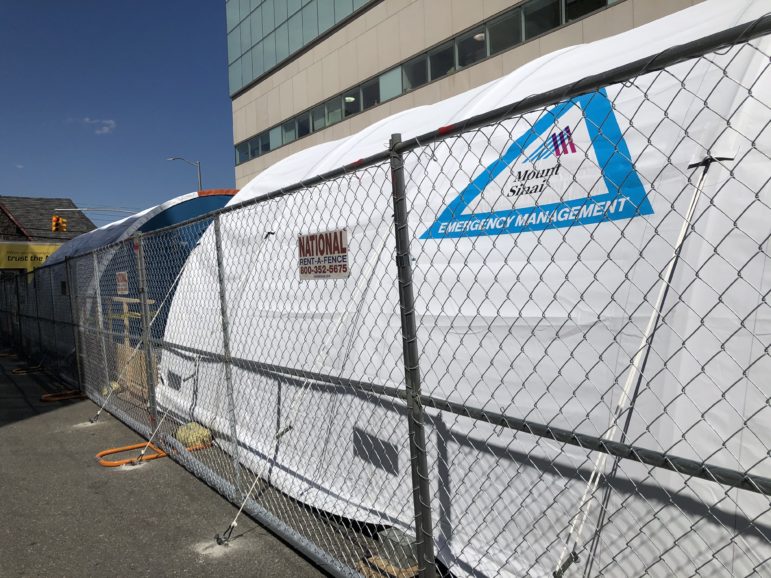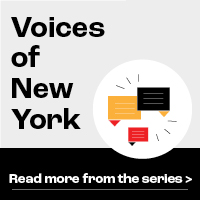
Jeanmarie Evelly
An emergency management tent outside Mount Sinai Queens Hospital in Astoria.Read the original story in Spanish at El Diario
Translated and condensed by Carlos Rodríguez Martorell
In New York City, an unanswered question lingers among hospital workers in the midst of the coronavirus crisis: Where will the additional doctors and nurses needed to increase capacity by 50 percent – as required by Governor Andrew Cuomo’s executive order – come from?
The Hispanic Association of Health Professionals (AHPSI), which has operated in New York for 25 years and includes more than 1,500 members of Latino origin, says it has a solution: It is time to create temporary, flexible licenses for the thousands of valuable immigrant health professionals living in the Big Apple and the tri-state area, and incorporate them into the emergency effort.
AHPSI President Dr. Aritmedes Restituyo, 62, insists that the states of New York, New Jersey and Connecticut are home to thousands of immigrant physicians, anesthesiologists and nurses with extensive experience working in hospitals in their countries of origin, and who are close to completing the complicated process of obtaining their U.S. licenses.
“We saw similar experiences in World War II. There are hundreds of top-level professionals who are doing other work and who would be willing to lend a hand during this catastrophe,” said the Dominican-born physician. “For years, we have been warning of an impending crisis in the hospital industry due to the lack of nurses, a crucial factor in this crisis.”
Dr. Mario Leyva, also a member of AHPSI, thinks incorporating Army personnel into the emergency response efforts is not the best way to meet the sector’s needs. Though vital from a logistics perspective, the physician said, they are not trained to tend to trauma patients.
“At this moment, New York is going to need doctors and nurses in decisive positions who are trained for other types of situations, on strategic monitoring and primary assessment. Putting a soldier in the position to make these decisions is a total mistake,” said Leyva, who was born in Cuba.
The health professionals who form the AHPSI believe that, in light of a potential impending “health catastrophe,” it is a matter of time before state authorities and some cities consider making it easier to obtain licenses to work provisionally in the medical and paramedic fields.
Dominican-born physician Juan de Dios de la Cruz, 80, who works in an urgent care center in Washington Heights, said that the scenario is getting more complicated by the minute and that the demand for health professionals will only increase.
“What I have seen is that many retired doctors and nurses are being called to make their knowledge available during this crisis, but, unfortunately, they either have a different life now or simply suffer from chronic illness and are unwilling to risk their lives in the ‘front lines,’ if you will,” he said.
Restituyo agrees that it will not be easy to “recruit” thousands of health professionals out of their retirement to deal with an emergency after having endured the stress of the job for 25 or 30 years.
“I think one of the strategies Governor Cuomo will have to consider is simplifying the process of obtaining a temporary license to practice for hundreds of professionals who have studied in Latin America’s best universities and who have experience working in hospitals in Mexico, Ecuador, Colombia, Venezuela, the Dominican Republic, who are living in our neighborhoods and who would be thrilled to lend their strategic support in this emergency,” said Restituyo.
As an example, the physician said that thousands of health professionals who are out of a job in the tri-state area’s main cities are able to carry out an intubation, a primary care procedure to provide patients with mechanical ventilation.
Mirtha Fonseca, a 68-year-old retired nurse born in Colombia, said in a phone interview with El Diario that she feels strong enough to join the volunteers reserve and help out in the public health emergency caused by COVID-19, but under a few conditions.
“I got an email in which they asked about my availability. I still feel healthy at my age, and I would be happy to give back to this country for the opportunities it has offered me and my family, even with my last breath. However, I obviously cannot do long shifts the way I used to, and I would like to stay far away from the Lincoln Medical Hospital in The Bronx, where I served and where my medical supervisor almost killed me of stress,” said Fonseca, who lives in Queens.
The retired nurse said that the knowledge that appropriate biosafety protocols are not being followed, such as replacing masks after a certain number of hours, is probably one of the reasons keeping retired health professionals from joining in during the emergency.
“I see another issue in our Hispanic community: We generally retire to be able to take care of our grandchildren so that our children can go to work. I know there are many cases like mine,” she said.
Meanwhile, the AHPSI is organizing a delegation of Hispanic doctors and paramedics living in NY who are not licensed to work in health centers here but would be accepted to offer support at coronavirus emergency centers in Italy and Spain.
“A great deal of help is needed in evacuation centers across Europe, where they have terminally-ill patients. We are organizing a mission with the extreme rigor the case requires and with the support of the corresponding embassies and every necessary security measure,” said Leyva.










3 thoughts on “Group Urges Allowing Unlicensed Immigrants with Healthcare Experience to Work in Hospitals”
Oh wonderful! Now just give temporary health care licensing to illegals?? What are you crazy!?? Let these “so called experienced health providers “ help their own. Illegals. Period! Americans want licensed physicians who actually know what there doing! They are licensed because they went to medical school! Just stop with the activists bs!
Hmm. I got something completely different from this article. It has nothing to do with citizenship. It is about temporarily granting urgently needed permissions to persons who possess specialty skillsets that are in high demand so they can use their knowledge to help mitigate the spread of a disease that is killing people indiscriminately regardless of race, creed, religion, or origin. It is a fine idea.
– and Deb, my family has been in this country since 1720; we’ve served in every War, I have over 26 years on active duty, I am veteran of the Iraq War, and I am currently serving overseas away from my family.
I have served alongside all nationalities of men and women and with other partner nations in combined support of the National Security of our great country. One thing I know to be true is that one of our Nation’s most cherished commodities is the willingness to give freely, selflessly to the service of our country whenever she calls. Well, Deb, the Nation is calling. These fine people are trying to answer. Lest we forget that obstacles are often manmade, we will surely defeat this virus and the sun will continue to shine on the Great Nation of the United States of America and the World. Or, we can allow bigotry and misinformation to swallow the would be efforts of many before the challenges are met. One by one we decide.
Don’t they need health professionals in their countries of origin? COVID-19 is coming there too. What goes around, comes around. They could be practicing their skills there long before the licensing paper work is done here.